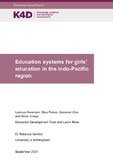| dc.contributor.author | Newman, Lorenzo | |
| dc.contributor.author | Pelosi, Alice | |
| dc.contributor.author | Zino, Giovanni | |
| dc.contributor.author | Crespi, Silvia | |
| dc.contributor.author | Gordon, Rebecca | |
| dc.date.accessioned | 2021-09-08T10:32:40Z | |
| dc.date.available | 2021-09-08T10:32:40Z | |
| dc.date.issued | 2021-09 | |
| dc.identifier.citation | Newman, L., Pelosi., A, Zino, G., Crespi, S., & Gordon, R. (2021). Education systems for girls’ education in the Indo-Pacific region. K4D Emerging Issues Report 45. Brighton, UK: Institute of Development Studies. DOI: 10.19088/K4D.2021.114 | en |
| dc.identifier.uri | https://opendocs.ids.ac.uk/opendocs/handle/20.500.12413/16833 | |
| dc.description | The K4D Emerging Issues report series highlights research and emerging evidence to policymakers to help inform policies that are more resilient to the future. K4D staff researchers work with thematic experts and the UK Government’s Foreign, Commonwealth & Development Office (FCDO) to identify where new or emerging research can inform and influence policy.
This report is based on 10 days of desk-based research, carried out during July 2021.
K4D services are provided by a consortium of leading organisations working in international development, led by the Institute of Development Studies (IDS), with the Education Development Trust, Itad, University of Leeds Nuffield Centre for International Health and Development, Liverpool School of Tropical Medicine (LSTM), University of Birmingham International Development Department (IDD), and the University of Manchester Humanitarian and Conflict Response Institute (HCRI). | en |
| dc.description.abstract | Despite substantial progress over the last two decades, girls in many parts of the world experience worse educational outcomes than boys, particularly at the secondary and tertiary levels. The COVID-19 pandemic appears to have exacerbated this learning gap in many regions, making research on the relationship between girls’ education outcomes and education systems increasingly urgent.
This rapid review explores the determinants of girls’ education outcomes in a specific group of Indo-Pacific countries. It examines the education system determinants of these outcomes such as government investment, teacher training, water, sanitation, and hygiene (WASH) infrastructure in schools, school-related gender-based violence, and indirect costs of education, drawing from pre-COVID-19 data. It also investigates societal determinants such as political factors, poverty rates, labour market participation trends, and child marriage rates. By attempting to explain differences in learning outcomes for girls, it also achieves a typology of countries in the region and suggests ideas for further research and FCDO programming. | en |
| dc.language.iso | en | en |
| dc.publisher | Institute of Development Studies | en |
| dc.relation.ispartofseries | Emerging Issues Report;45 | |
| dc.rights | CC0 1.0 Universal | * |
| dc.rights.uri | https://www.nationalarchives.gov.uk/doc/open-government-licence/version/3/ | * |
| dc.subject | Education | en |
| dc.subject | Gender | en |
| dc.title | Education Systems for Girls’ Education in the Indo-Pacific Region | en |
| dc.type | Emerging Issues Reports | en |
| dc.rights.holder | © Crown copyright 2021. | en |
| dc.identifier.doi | 10.19088/K4D.2021.114 | |
| rioxxterms.funder | Department for International Development, UK Government | en |
| rioxxterms.identifier.project | K4D | en |
| rioxxterms.version | VoR | en |
| rioxxterms.versionofrecord | 10.19088/K4D.2021.114 | en |
| rioxxterms.funder.project | 238a9fa4-fe4a-4380-996b-995f33607ba0 | en |

